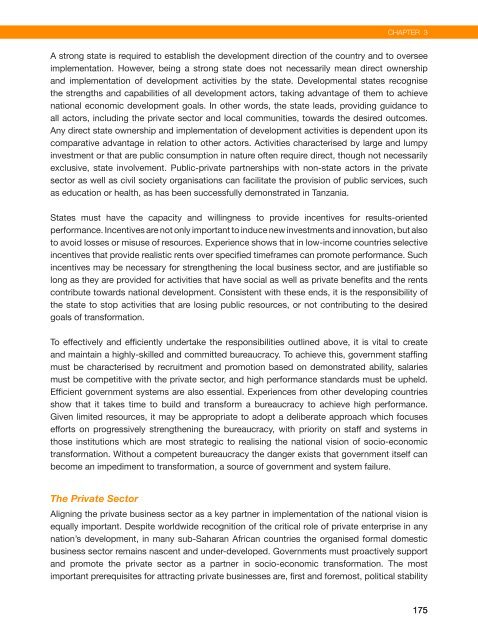Poverty and Human Development Report 2009 - UNDP in Tanzania
Poverty and Human Development Report 2009 - UNDP in Tanzania
Poverty and Human Development Report 2009 - UNDP in Tanzania
You also want an ePaper? Increase the reach of your titles
YUMPU automatically turns print PDFs into web optimized ePapers that Google loves.
Chapter 3<br />
A strong state is required to establish the development direction of the country <strong>and</strong> to oversee<br />
implementation. However, be<strong>in</strong>g a strong state does not necessarily mean direct ownership<br />
<strong>and</strong> implementation of development activities by the state. <strong>Development</strong>al states recognise<br />
the strengths <strong>and</strong> capabilities of all development actors, tak<strong>in</strong>g advantage of them to achieve<br />
national economic development goals. In other words, the state leads, provid<strong>in</strong>g guidance to<br />
all actors, <strong>in</strong>clud<strong>in</strong>g the private sector <strong>and</strong> local communities, towards the desired outcomes.<br />
Any direct state ownership <strong>and</strong> implementation of development activities is dependent upon its<br />
comparative advantage <strong>in</strong> relation to other actors. Activities characterised by large <strong>and</strong> lumpy<br />
<strong>in</strong>vestment or that are public consumption <strong>in</strong> nature often require direct, though not necessarily<br />
exclusive, state <strong>in</strong>volvement. Public-private partnerships with non-state actors <strong>in</strong> the private<br />
sector as well as civil society organisations can facilitate the provision of public services, such<br />
as education or health, as has been successfully demonstrated <strong>in</strong> <strong>Tanzania</strong>.<br />
States must have the capacity <strong>and</strong> will<strong>in</strong>gness to provide <strong>in</strong>centives for results-oriented<br />
performance. Incentives are not only important to <strong>in</strong>duce new <strong>in</strong>vestments <strong>and</strong> <strong>in</strong>novation, but also<br />
to avoid losses or misuse of resources. Experience shows that <strong>in</strong> low-<strong>in</strong>come countries selective<br />
<strong>in</strong>centives that provide realistic rents over specified timeframes can promote performance. Such<br />
<strong>in</strong>centives may be necessary for strengthen<strong>in</strong>g the local bus<strong>in</strong>ess sector, <strong>and</strong> are justifiable so<br />
long as they are provided for activities that have social as well as private benefits <strong>and</strong> the rents<br />
contribute towards national development. Consistent with these ends, it is the responsibility of<br />
the state to stop activities that are los<strong>in</strong>g public resources, or not contribut<strong>in</strong>g to the desired<br />
goals of transformation.<br />
To effectively <strong>and</strong> efficiently undertake the responsibilities outl<strong>in</strong>ed above, it is vital to create<br />
<strong>and</strong> ma<strong>in</strong>ta<strong>in</strong> a highly-skilled <strong>and</strong> committed bureaucracy. To achieve this, government staff<strong>in</strong>g<br />
must be characterised by recruitment <strong>and</strong> promotion based on demonstrated ability, salaries<br />
must be competitive with the private sector, <strong>and</strong> high performance st<strong>and</strong>ards must be upheld.<br />
Efficient government systems are also essential. Experiences from other develop<strong>in</strong>g countries<br />
show that it takes time to build <strong>and</strong> transform a bureaucracy to achieve high performance.<br />
Given limited resources, it may be appropriate to adopt a deliberate approach which focuses<br />
efforts on progressively strengthen<strong>in</strong>g the bureaucracy, with priority on staff <strong>and</strong> systems <strong>in</strong><br />
those <strong>in</strong>stitutions which are most strategic to realis<strong>in</strong>g the national vision of socio-economic<br />
transformation. Without a competent bureaucracy the danger exists that government itself can<br />
become an impediment to transformation, a source of government <strong>and</strong> system failure.<br />
The Private Sector<br />
Align<strong>in</strong>g the private bus<strong>in</strong>ess sector as a key partner <strong>in</strong> implementation of the national vision is<br />
equally important. Despite worldwide recognition of the critical role of private enterprise <strong>in</strong> any<br />
nation’s development, <strong>in</strong> many sub-Saharan African countries the organised formal domestic<br />
bus<strong>in</strong>ess sector rema<strong>in</strong>s nascent <strong>and</strong> under-developed. Governments must proactively support<br />
<strong>and</strong> promote the private sector as a partner <strong>in</strong> socio-economic transformation. The most<br />
important prerequisites for attract<strong>in</strong>g private bus<strong>in</strong>esses are, first <strong>and</strong> foremost, political stability<br />
175





